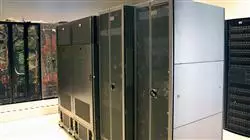University certificate
The world's largest faculty of information technology”
Introduction to the Program
If you are looking for a quality program that will help you start working in one of the fields with the most professional prospects, this is your best option”

Advances in telecommunications are happening all the time, as this is one of the fastest evolving areas. It is therefore necessary to have IT experts who can adapt to these changes and have first hand knowledge of the new tools and techniques that are emerging in this field.
This Postgraduate certificate in Data Centers, Network Operation and Services addresses the complete range of topics involved in this field. Its study has a clear advantage over other programs that focus on specific blocks, which prevents students from knowing the interrelation with other areas included in the multidisciplinary field of telecommunications. In addition, the teaching team of this educational program has made a careful selection of each of the topics of this program in order to offer students the most complete study opportunity possible and always linked to current events.
The educational program focuses on all aspects related to data centers: components, control systems, design, organization, models; or the entire CloudComputing infrastructure, among other aspects that will enable professionals to specialize in this area.
This Postgraduate certificate is aimed at those interested in achieving a higher level of knowledge in Data Centers, Network Operation and Services The main objective is to enable students to apply the knowledge acquired in this Postgraduate certificate in the real world, in a work environment that reproduces the conditions that may be found in their future, in a rigorous and realistic way, user identification and biometric systems, cryptography, or security in Internet services, among other aspects.
Additionally, as it is a 100% online program, the student is not constrained by fixed timetables or the need to move to another physical location, but can access the contents at any time of the day, balancing their professional or personal life with their academic life.
Do not miss the opportunity to take this Postgraduate certificate in Data Centers, Network Operation and Services. It's the perfect opportunity to advance your career"
This Postgraduate certificate in Data Centers, Network Operation and Services contains the most complete and up-to-date educational program on the market. The most important features include:
- Practical cases presented by experts in Data Centers, Network Operation and Services
- The graphic, schematic, and practical contents with which they are created, provide scientific and practical information on the disciplines that are essential for professional practice
- Practical exercises where self assessment can be used to improve learning
- Special emphasis on innovative methodologies in Data Centers, Network Operation and Services
- Theoretical lessons, questions to the expert, debate forums on controversial topics, and individual reflection assignments
- Content that is accessible from any fixed or portable device with an Internet connection
This Postgraduate certificate is the best investment you can make when selecting a refresher program to update your knowledge in Data Centers, Network Operation and Services”
The teaching staff includes professionals from the field of information technology, who bring their experience to this specialization program, as well as renowned specialists from leading societies and prestigious universities.
The multimedia content, developed with the latest educational technology, will provide the professional with situated and contextual learning, i.e., a simulated environment that will provide immersive education programmed to learn in real situations.
This program is designed around Problem-Based Learning, whereby the professional must try to solve the different professional practice situations that arise during the academic year. For this, the professional will have the help of an innovative, interactive video system made by recognized and experienced experts in Data Centers, Network Operation and Services.
This 100% online Postgraduate certificate will allow you to combine your studies with your professional work"

This program comes with the best educational material, providing you with a contextual approach that will facilitate your learning"
Syllabus
The structure of the contents has been designed by the best professionals in the from the engineering sector, with extensive experience and recognized prestige in the profession.

We have the most complete and up to date educational program on the market. We strive for excellence and for you to achieve it too"
Module 1. Data Centers, Network Operation and Services
1.1. Data Center: Basic Concepts and Components
1.1.1. Introduction
1.1.2. Basic Concepts
1.1.2.1. CD Definition
1.1.2.2. Classification and Importance
1.1.2.3. Catastrophes and Losses
1.1.2.4. Evolutionary Trend
1.1.2.5. Complexity Costs
1.1.2.6. Pillars and Redundancy Layers
1.1.3. Design Philosophy
1.1.3.1. Objectives
1.1.3.2. Location Selection
1.1.3.3. Availability
1.1.3.4. Critical Elements
1.1.3.5. Cost Evaluation and Analysis
1.1.3.6. IT Budget
1.1.4. Basic Components
1.1.4.1. Access Floor
1.1.4.2. Tile Types
1.1.4.3. General Considerations
1.1.4.4. DC Size
1.1.4.5. Racks
1.1.4.6. Servers and Communication Equipment
1.1.4.7. Monitoring
1.2. Data Center: Control Systems
1.2.1. Introduction
1.2.2. Power Supply
1.2.2.1. Electrical Network
1.2.2.2. Electrical Power
1.2.2.3. Electrical Distribution Strategies
1.2.2.4. UPS
1.2.2.5. Generators
1.2.2.6. Electrical Problems
1.2.3. Environmental Control
1.2.3.1. Temperature
1.2.3.2. Humidity
1.2.3.3. Air Conditioning
1.2.3.4. Caloric Estimation
1.2.3.5. Refrigeration Strategies
1.2.3.6. Corridor Design. Air Circulation
1.2.3.7. Sensors and Maintenance
1.2.4. Safety and Fire Prevention
1.2.4.1. Physical Security
1.2.4.2. Fire and its Classification
1.2.4.3. Classification and Types of Extinction Systems
1.3. Data Center: Design and Organization
1.3.1. Introduction
1.3.2. Network Design
1.3.2.1. Typology
1.3.2.2. Structured Cabling
1.3.2.3. Backbone
1.3.2.4. UTP and STP Network Cables
1.3.2.5. Telephone Cables
1.3.2.6. Terminal Elements
1.3.2.7. Fiber Optic Cables
1.3.2.8. Coaxial Cable
1.3.2.9. Wireless Transmission
1.3.2.10. Recommendations and Labeling
1.3.3. Organization
1.3.3.1. Introduction
1.3.3.2. Basic Measures
1.3.3.3. Cable Management Strategies
1.3.3.4. Policies and Procedures
1.3.4. DC Management
1.3.5. Data Center Standards
1.4. Data Center: Models and Business Continuity
1.4.1. Introduction
1.4.2. Optimization
1.4.2.1. Optimization Techniques
1.4.2.2. Eco-Friendly Data Centers
1.4.2.3. Current Challenges
1.4.2.4. Modular Data Centers
1.4.2.5. Housing
1.4.2.6. Data Centre Consolidation
1.4.2.7. Monitoring
1.4.3. Business Continuity
1.4.3.1. BCP. Business Continuity Plan. Key Points
1.4.3.2. DR. Disaster Recovery Plan
1.4.3.3. DR Implementation
1.4.3.4. Backup and Strategies
1.4.3.5. Back Up Data Center
1.4.4. Best Practices
1.4.4.1. Recommendations
1.4.4.2. Use of ITIL Methodology
1.4.4.3. Availability Metrics
1.4.4.4. Environmental Control
1.4.4.5. Risk Management
1.4.4.6. DC Manager
1.4.4.7. Tools
1.4.4.8. Implementation Tips
1.4.4.9. Characterization
1.5. Cloud Computing: Introduction and Basic Concepts
1.5.1. Introduction
1.5.2. Basic Concepts and Terminology
1.5.3. Objectives and Benefits
1.5.3.1. Availability
1.5.3.2. Reliability
1.5.3.3. Scales
1.5.4. Risks and Challenges
1.5.5. Roles: Provider-Consumer
1.5.6. Features of a CLOUD
1.5.7. Service Delivery Models
1.5.7.1. IaaS
1.5.7.2. PaaS
1.5.7.3. SaaS
1.5.8. Types of Cloud
1.5.8.1. Public
1.5.8.2. Private
1.5.9.3. Hybrid
1.5.9. CLOUD Enabling Technologies
1.5.9.1. Network Architectures
1.5.9.2. Broadband Networks. Interconnectivity
1.5.9.3. Data Center Technologies
1.5.9.3.1. Computing
1.5.9.3.2. Storage
1.5.9.3.3. Networking
1.5.9.3.4. High Availability
1.5.9.3.5. Backup Systems
1.5.9.3.6. Balancers
1.5.9.4. Virtualization
1.5.9.5. Web Technologies
1.5.9.6. Multitenant Technology
1.5.9.7. Service Technology
1.5.9.8. Cloud Security
1.5.9.8.1. Terms and Concepts
1.5.9.8.2. Integrity, Authentication
1.5.9.8.3. Security Mechanisms
1.5.9.8.4. Security Threats
1.5.9.8.5. Cloud Security Attacks
1.5.9.8.6. Case Study
1.6. Cloud Computing: Technology and Cloud Security
1.6.1. Introduction
1.6.2. Mechanisms of CLOUD Infrastructure
1.6.2.1. Network Perimeter
1.6.2.2. Storage
1.6.2.3. Server Environment
1.6.2.4. Cloud Monitoring
1.6.2.5. High Availability
1.6.3. CLOUD Security Mechanisms (Part I)
1.6.3.1. Automation
1.6.3.2. Load Balancers
1.6.3.3. SLA Monitor
1.6.3.4. Pay-As-You-Go Mechanisms
1.6.4. CLOUD Security Mechanisms (Part II)
1.6.4.1. Traceability and Auditing Systems
1.6.4.2. Failover Systems
1.6.4.3. Hypervisor
1.6.4.4. Clustering
1.6.4.5. Multitenant Systems
1.7. Cloud Computing: Infrastructure. Control and Safety Mechanisms
1.7.1. Introduction to Cloud Management Mechanisms
1.7.2. Administrating Remote Systems
1.7.3. Resource Management Systems
1.7.4. Service Level Agreement Management Systems
1.7.5. Invoicing Management Systems
1.7.6. Mechanisms of Cloud Security
1.7.6.1. Encryption
1.7.6.2. Hashing
1.7.6.3. Digital Signature
1.7.6.4. PKI
1.7.6.5. Identity and Access Management
1.7.6.6. SSO
1.7.6.7. Cloud-Based Security Groups
1.7.6.8. Bastioning Systems
1.8. Cloud Computing: Cloud Architectures
1.8.1. Introduction
1.8.2. Basic Cloud Architectures
1.8.2.1. Workload Distribution Architectures
1.8.2.2. Resource Usage Architectures
1.8.2.3. Scalable Architectures
1.8.2.4. Load Balancing Architectures
1.8.2.5. Redundant Architectures
1.8.2.6. Examples
1.8.3. Advanced Cloud Architectures
1.8.3.1. Hypervisor Cluster Architectures
1.8.3.2. Virtual Load Balancing Architectures
1.8.3.3. Non-Stop Architectures
1.8.3.4. High Availability Architectures
1.8.3.5. BareMetal Architectures
1.8.3.6. Redundant Architectures
1.8.3.7. Hybrid Architectures
1.8.4. Specialised Cloud Architectures
1.8.4.1. Direct I/O Access Architectures
1.8.4.2. Direct LUN Access Architectures
1.8.4.3. Elastic Network Architectures
1.8.4.4. SDDC Architectures
1.8.4.5. Special Architectures
1.8.4.6. Examples
1.9. Cloud Computing: Service Provision Models
1.9.1. Introduction
1.9.2. Cloud Service Provision
1.9.3. Service Provider Perspective
1.9.4. Consumer Perspective of these Services
1.9.5. Study Cases
1.10. Cloud Computing: Contracting Models, Metrics and Service Providers
1.10.1. Introduction to Invoicing Models and Metrics
1.10.2. Invoicing Models
1.10.3. Pay-As-You-Go Metrics
1.10.4. Cost Management Considerations
1.10.5. Introduction to Quality-of-Service Metrics and SLAs
1.10.6. Service Quality Metrics
1.10.7. Service Performance Metrics
1.10.8. Service Scalability Metrics
1.10.9. SLA Service Model
1.10.10. Study Cases

This program will allow you to advance in your career comfortably”
Postgraduate Certificate in Data Centers, Network Operation and Services
.
Are you ready to take a step forward in your professional career? TECH Global University's School of Computer Science offers you the opportunity to gain cutting-edge skills in the exciting world of data centers, network operation and services with an exclusive Postgraduate Certificate taught in online mode. By enrolling in this program, you will be immersed in a deep knowledge supported by a team of highly trained and experienced teachers. At the institution, we pride ourselves on having a faculty that excels in their field and is committed to your success. This degree will allow you to explore key topics from systems administration, to data security, to network services management. You will develop essential skills to design, operate and maintain critical IT infrastructures. At the end of the program, you'll earn a certificate that will open doors to a wide range of career opportunities in an ever-growing marketplace.
Acquire solid knowledge in data centers
.
At TECH we not only offer you solid knowledge, but also the opportunity to apply it in hands-on, collaborative projects. You will develop crucial problem-solving, decision-making and leadership skills, which will allow you to stand out in a highly competitive and constantly evolving job market. Can you imagine yourself working in leading technology companies, managing their data centers efficiently or ensuring uninterrupted network connectivity? These are just some of the exciting prospects that await you upon completion of this course. So what are you waiting for? Join us on this journey into a future full of opportunities in the world of information technology. We are ready to accompany you in your professional growth - enroll today in the Postgraduate Certificate in Data Center, Network Operation and Services and take control of your career destiny!







